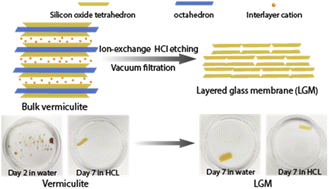Nanofluidic proton channels based on a 2D layered glass membrane with improved aqueous and acid stability†
Abstract
Layered two-dimensional (2D) membranes hold great promise in the study of confined ion transport and nanofluidic applications. However, 2D layered membranes suffer from poor stability in water and harsh chemical conditions. Here we use amorphous silica-based nanosheets obtained by vermiculite to assemble a layered glass membrane (LGM) with a 2D nanofluidic channel network in the interlayer space. We find that the water stability and corrosion resistance of the LGM are improved compared to that of the layered vermiculite membrane. Moreover, the surface charge-governed proton conductivity of LGM remains stable at about 4 × 10−2 S cm−1 when the HCl solution concentration changes by orders of magnitude. The enhanced stability of LGM is of great significance for the study of confined ion transport and is expected to be applied to more nanofluidic applications, such as water treatment, molecular sieving, and osmotic energy conversion.



 Please wait while we load your content...
Please wait while we load your content...